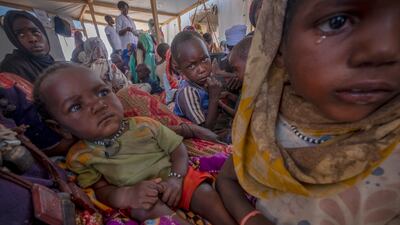Four months after famine was confirmed in the Zamzam camp in North Darfur, five new areas are experiencing famine in Sudan, including Abu Shouk and Al Salam camps in North Darfur, and in the Western Nuba Mountain, according to the UN-backed Famine Review Committee (FRC).
Five additional areas are projected to experience famine from this month until May, and there is significant risk of more famines spreading across 17 more areas during the same period.
The committee is linked to the Integrated Food Phase Classification (IPC) – a global initiative by UN agencies, aid groups and governments to identify famine conditions. It is a tool used to classify the severity and magnitude of food insecurity and malnutrition, and for decision-makers to identify areas most in need of assistance.
More than 24.6 million people across Sudan, representing more than half of the analysed population, are now experiencing high levels of acute food insecurity (IPC Phase 3 or above), with 8.1 million in emergency conditions (IPC Phase 4) and at least 638,000 people in IPC Phase 5 (catastrophe).
Conflict, displacement, and restricted humanitarian access remain the primary drivers of this crisis. In the Zamzam camp, conditions remain critical despite some humanitarian food assistance deliveries.
These findings are particularly alarming as they have been released during Sudan’s winter harvest season when food availability should be at its highest, indicating that the continuing conflict is severely limiting markets and the movement of goods.
Sustained violence and economic hardship have disrupted markets, displaced millions, and driven prices of staple goods to unaffordable levels for most people. Furthermore, destruction and looting of aid deliveries by both sides of the civil war has worsened the situation markedly.
“The continuing conflict, continuous displacements and recurrent disease outbreaks have created a dangerous breeding ground for malnutrition in Sudan,” said Unicef director of emergency operations, Lucia Elmi.
Furthermore, areas of intense conflict, including parts of Khartoum and Al Jazeera, may already be experiencing famine conditions (IPC Phase 5), but a lack of reliable or recent data makes it impossible to confirm the extent of the crisis in these regions.
WFP’s Director of Food Security and Nutrition Analysis
The Food and Agriculture Organisation of the United Nations (FAO), the World Food Programme (WFP) and Unicef are urging the international community to prioritise funding for humanitarian efforts and leverage diplomatic channels to secure a ceasefire and unrestricted access.
“A protracted famine is taking hold in Sudan,” said WFP’s Director of Food Security and Nutrition Analysis, Jean-Martin Bauer. “People are getting weaker and weaker and are dying as they have had little to no access to food for months and months.”
All parties to the conflict must ensure safe, immediate, and unhindered access to areas classified as IPC Phase 3 and above to prevent the crisis from escalating further in 2025, putting millions more lives at risk, the FRC report said.
The agencies said they are ramping up their humanitarian response in Sudan, focusing on high-risk areas with integrated health, nutrition, WASH, social protection, and food security interventions.
The predictions are expected to start before the next rainy season in June, with humanitarian access hindered by blockades that have been instated by both sides of the civil war in areas under their control, and logistical challenges.
Immediate action to preposition supply stocks is critical to preventing human suffering on an unprecedented scale, the UN, FAO and Unicef said.


